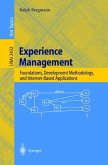This book presents a coherent and well-balanced collection of revised papers focusing on agent-mediated knowledge management. Most of the papers are extended and improved versions of work presented at the Symposium on Agent-Mediated Knowledge Management, AMKM 2003, held during the AAAI Spring Symposium in Stanford, CA, USA in March 2003; also included are 3 special articles, including a detailed introduction to the topic by the volume editors.
The 28 papers are organized in topical sections on collaboration and peer-to-peer support
- agent-based community support
- agent models for knowledge and organizations
- context and personalization
- ontologies and semantic Web
- agents and knowledge engineering.
In this book, we present a collection of papers around the topic of Agent- Mediated Knowledge Management. Most of the papers are extended and - provedversions of work presented at the symposium on Agent-Mediated Kno- edge Management held during the AAAI Spring Symposia Series in March 2003 at Stanford University. The aim of the Agent-Mediated Knowledge Management symposium was to bring together researchers and practitioners of the ?elds of KM and agent te- nologiestodiscussthebene?ts,possibilitiesandadded-valueofcross-fertilization. Knowledge Management (KM) has been a predominant trend in bu- ness in recent years. Not only is Knowledge Management an important ?eld of applicationfor AIandrelatedtechniques,suchasCBRtechnologyforintelligent lessons-learned systems, it also provides new challenges to the AI community, like, for example, context-aware knowledge delivery. Scaling up research pro- typestoreal-worldsolutionsusuallyrequiresanapplication-drivenintegrationof several basic technologies, e.g., ontologies for knowledge sharing and reuse, c- laboration support like CSCW systems, and personalized information services. Typical characteristics to be dealt with in such an integration are: manifold, logically and physically dispersed actors and knowledge sources, di?erent degrees of formalization of knowledge, di?erent kinds of (Web-based) services and (legacy) systems, con?icts between local (individual) and global (group or organizational) goals.
The 28 papers are organized in topical sections on collaboration and peer-to-peer support
- agent-based community support
- agent models for knowledge and organizations
- context and personalization
- ontologies and semantic Web
- agents and knowledge engineering.
In this book, we present a collection of papers around the topic of Agent- Mediated Knowledge Management. Most of the papers are extended and - provedversions of work presented at the symposium on Agent-Mediated Kno- edge Management held during the AAAI Spring Symposia Series in March 2003 at Stanford University. The aim of the Agent-Mediated Knowledge Management symposium was to bring together researchers and practitioners of the ?elds of KM and agent te- nologiestodiscussthebene?ts,possibilitiesandadded-valueofcross-fertilization. Knowledge Management (KM) has been a predominant trend in bu- ness in recent years. Not only is Knowledge Management an important ?eld of applicationfor AIandrelatedtechniques,suchasCBRtechnologyforintelligent lessons-learned systems, it also provides new challenges to the AI community, like, for example, context-aware knowledge delivery. Scaling up research pro- typestoreal-worldsolutionsusuallyrequiresanapplication-drivenintegrationof several basic technologies, e.g., ontologies for knowledge sharing and reuse, c- laboration support like CSCW systems, and personalized information services. Typical characteristics to be dealt with in such an integration are: manifold, logically and physically dispersed actors and knowledge sources, di?erent degrees of formalization of knowledge, di?erent kinds of (Web-based) services and (legacy) systems, con?icts between local (individual) and global (group or organizational) goals.








